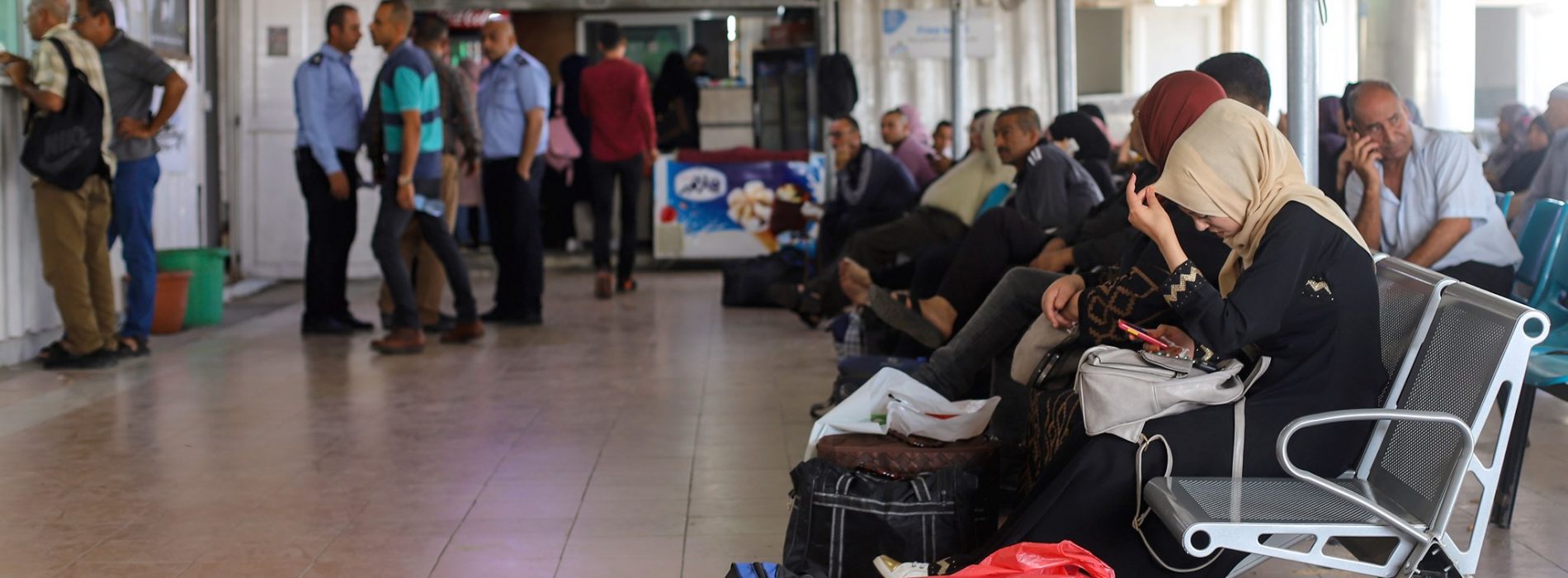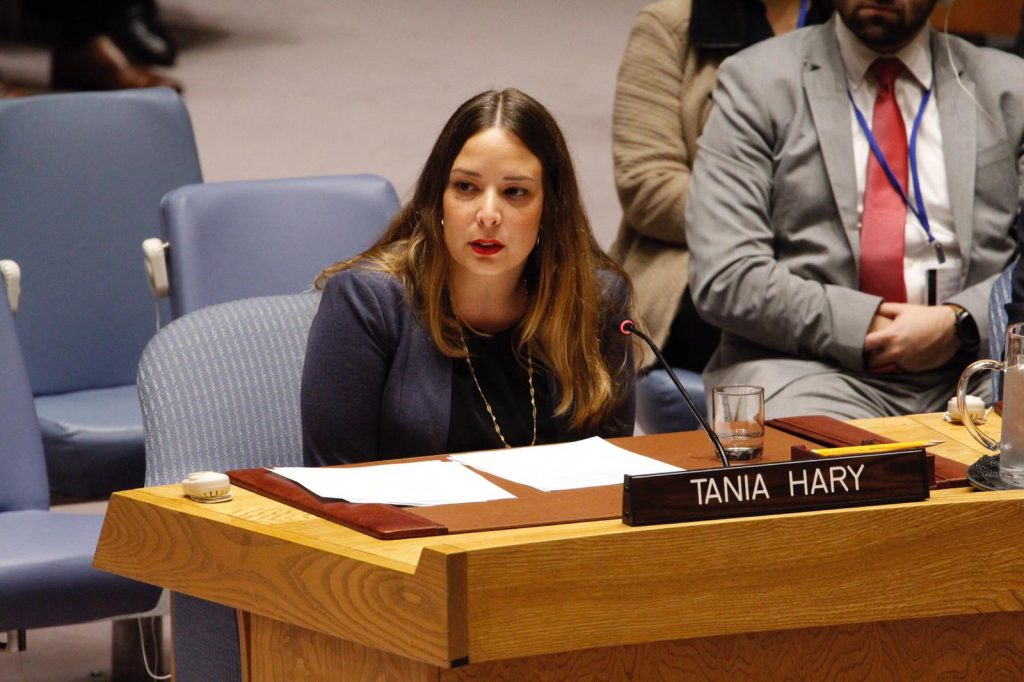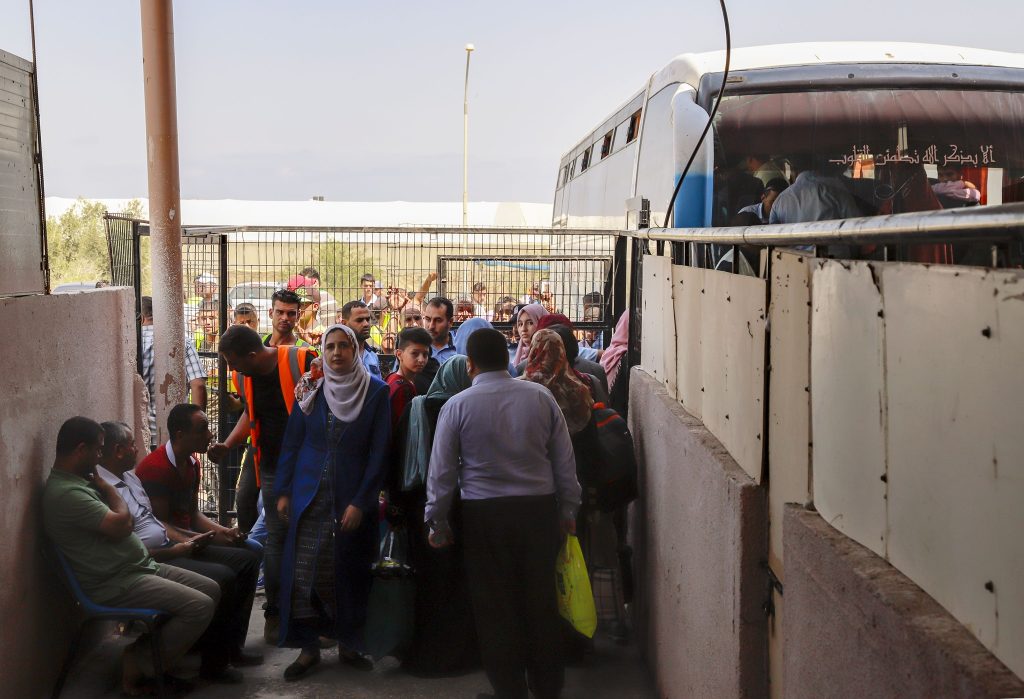- About Us
- Policy Center
- Learn
- Press Room
- Blog
- Get Involved
- Donate
- Donate to J Street Online
- Make a Gift in Someone’s Honor or Memory
- Make a Monthly Gift
- Tax-Deductible Donations
- Giving by mail

J Street is proud to stand with progressive, pro-peace Israeli organizations who do amazing work to create a better future for Israelis and Palestinians. As part of a series of profiles focused on our progressive partners, we spoke with senior staff at Gisha, an Israeli legal advocacy group fighting for a more just and free future.
Kholoud Jwefil, a 23-year-old social worker in the Gaza strip, has never stepped foot outside the 25 mile-long, five-mile-wide Palestinian territory. “I got a scholarship outside Gaza but I couldn’t keep it because I didn’t have the permission, Israeli permission,” she told Gisha, an Israeli legal nonprofit fighting for Palestinians’ rights to leave and enter Gaza. “I felt like my dream went to smoke.”
Since 2005, Gisha — a name which means “access” in Hebrew — has represented both individuals and organizations in legal proceedings and has advocated for freedom of movement for Palestinians in the Occupied Territories. “You don’t realize how much movement and access is taken for granted until you see what happens when it’s taken away,” says Tania Hary, Gisha’s executive director.

Although the Israeli government unilaterally withdrew settlers and security forces from Gaza in 2005, the territory is still considered occupied under international law. The Israeli government imposes a blockade on Gaza’s air and maritime space and six of Gaza’s seven land crossings. The Israeli government also controls access to water, electricity, telecommunications and other utilities — they are also often the sole decision-maker when it comes to a Gaza resident’s access to Israel, the West Bank or the outside world.
“I think that most people don’t realize that residents of Gaza still, to this day, need permits to travel either out of the strip or to the West Bank,” says Jessica Burnstein, Gisha’s Director of International Relations. The restrictions apply to commercial and humanitarian goods as well, including food and medical equipment. “Businesspeople are losing hundreds of thousands of dollars in goods that they’ve purchased that are rotting, people who can’t get to their cancer treatments, a person misses the funeral of their mother, these are all real cases we’ve worked on,” she says.
“Israel believes that it can manage the humanitarian situation in Gaza,” Hary told the United Nations in a 2019 address, characterizing the government’s movement restrictions as the cornerstone of the occupation. “It has an interest in maintaining the physical and political separation of Palestinians, which allows it to pursue annexation in the West Bank.”

“We’re the only Israeli Human Rights organization focusing on the situation in Gaza,” Gisha Executive Director Tania Hary tells the United Nations in a 2019 address.
For both Hary and Burnstein, travel for study, to see relatives or to explore the world has been an integral part of their lives — to see it denied to others is painful, especially in desperate circumstances. “Often it happens that we’ve got a case where we’re dealing with a visit to a sick relative, then it becomes a case of attending a funeral,” Hary says. “Those kinds of cases are really the hardest to deal with — to be the one to have to deliver the news to people, to be the ones to try to articulate a reason or a justification when obviously there really is one.”
“We receive notes from people all the time telling us how much being able to see their family in their final days has meant to them,” Burnstein says. “For me, it really highlights the absurdity of the situation, that people who are that close and who live one hour’s drive from each other, have been prevented from seeing each other for so many years — there’s a real absurdity to it.”
Gisha describes permits for entry and exit to Gaza as “the exception, rather than the rule.” Only first-degree relatives in a narrow set of “exceptional, humanitarian” circumstances can visit one another. The result has been a “comprehensive denial of rights, fragmentation of Palestinian society, deteriorating humanitarian conditions, and deepening despair among the population.”
“Anything that’s beyond that basic humanitarian minimum, Israel says that it’s doing what it’s doing out of the goodness of its heart,” Burnstein says. Without Israeli advocates who know the system, seemingly arbitrary denials can be difficult to overturn. “One the one hand, you need Israel’s approval. On the other hand, they don’t see themselves as beholden to you.”
The Israeli government has long justified restrictions based on security concerns. Since the Hamas takeover of the strip in 2007, Israel’s restrictions have tightened — Hamas and other violent Islamist groups in Gaza regularly fire rockets indiscriminately into Israel.
But Gisha says that while security concerns are real, the Israeli government’s approach is also driven by the desire to pressure citizens to rise up against Hamas — and by an underlying “separation policy,” which aims to splinter the Gazan population from the West Bank as a way to undermine the prospects for Palestinian statehood.
“The impression largely from the outside is that Israel has no choice,” Burnstein says, “but there’s always been a political motivation for the restrictions that we’re seeing today.” Movement restrictions, such as the ban on studying abroad, pre-date the Hamas takeover. She points to cases including blocked shipments of strawberries and cancer equipment. “The idea was to harm the economy on purpose so that businessmen would pressure Hamas to lay down its weapons, or so that people would vote differently,” she says.
In international law, the unlawful tactic — in which civilian populations are punished for the actions of their leaders or other factions in society — is known as collective punishment. “Collective punishment shouldn’t be accepted,” Burnstein says, highlighting the Israeli government’s control of Gazan fishing zones, which are regularly restricted in response to protests on the border. “If the fishermen have nothing to do with the balloon launching, and if the restrictions are going to do nothing to stop the balloon launching, and if it’s hurting these families that are already struggling, then it should be a red line.”

Gaza residentss wait at a border crossing.
One of the rewarding aspects of Gisha’s work, Hary says, is when they are able to assist students to further their ambitions and study abroad. “The Gazan population is very young and full of potential.”
In the year 2000, Israel blocked access for Gaza students wishing to study in the West Bank or at international institutions. Many of them reached out to Gisha for help. “It started with a few students, and then there were tens of students, and then there were hundreds who were getting in touch with us,” Hary says.
Gisha assisted with both advocacy and legal proceedings, with seven Fulbright Scholarship recipients petitioning US Secretary of State Condoleezza Rice to intervene. “Finally Israel did allow, at first the seven students, but then all students going abroad,” Hary says. “For me that really did encapsulate what Gisha’s work really is about, it’s about removing obstacles for people just living their lives in a way that other people take for granted.”
“The permanent discourse about Gaza, especially in Israel but also in these rooms, revolves around terror or crisis,” Hary said in her UN address. “We’re lucky at Gisha to see nuance, entrepreneurship, resilience and potential.”
Hary points to the irony in using security as a justification for Gaza’s blockade, given that so many Israeli security experts have said that limited economic opportunity and mounting humanitarian crisis actually undermines security. “Security officials have been saying quite loudly, especially since 2014, that the situation in Gaza is unsustainable,” she says. “If people don’t have hope for the future, you’re going to see instability of one kind or another — you can’t separate out the banality of the bureaucratic decisions from the safety of Israelis and Palestinians themselves.”
Proposals that focus on economic investment but fail to acknowledge the impact of the occupation, are doomed to failure, she says. “Everyone needs to acknowledge that without a political solution we’re always going to be running in place — the occupation is overwhelmingly the factor that is harming Palestinian well-being, and without dealing with that no amount of investment or economic aid is going to be able to change that.”
Nevertheless, the US does have a role to play. “The US is a very, very influential actor – for good and for bad,” Burnstein says, “J Street supporters, in particular, have a really strong role to play to be voices for their Congresspeople to highlight these issues.” Hary hopes that the conversation around Gaza in the United States can become deeper and more nuanced. “I hope that people see beyond Hamas and the rockets and also connect to the stories,” she says, “to millions of people living in Gaza and the West Bank — they’re also people.”
“In my mind, I drew a picture for Gaza that people are living happily,” says Kholoud Jwefil, who was never able to take up her scholarship abroad. “Every graduate actually has a job, families are living well, women are receiving their rights, children are receiving their rights, we have one government, we have one authority, we don’t have this political division. We don’t request a lot, but we want to live normally like any country in the world.”
Watch Gisha Executive Director Tania Hary’s 2019 address to the United Nations, and the actions the international community can take to help, at this link.
J Street is at the forefront of a political movement to push back against the Trump-Netanyahu agenda and lay the groundwork for a new era of progressive, values-driven diplomacy-first American leadership.